Exploring Challenges: Teaching English for Specific Purposes (ESP)
VerifiedAdded on 2023/06/12
|17
|4619
|382
Essay
AI Summary
This essay examines the challenges encountered in teaching English for Specific Purposes (ESP) in England and Vietnam, highlighting the impact of globalization and varying levels of English proficiency among students. In England, challenges include motivating students, finding appropriate materials, and addressing the diverse needs of international students, particularly those for whom English is a second language. The essay notes that many international students attend English universities and require ESP courses to assist them in their studies. In Vietnam, the challenges are compounded by the fact that English is not widely spoken, leading to disparities in student proficiency and difficulties in integrating practical language skills. The essay emphasizes the importance of teacher competence, continuous professional development, and collaboration between ESP and subject teachers to effectively meet the specific needs of learners in both contexts. It also touches on the evolution of ESP, its focus on learner needs, and the distinction between English for Occupational Purposes (EOP) and English for Academic Purposes (EAP).

Running head: CHALLENGES IN TEACHING ESP IN ENGLAND AND
VIETNAM
1
VIETNAM
1
Paraphrase This Document
Need a fresh take? Get an instant paraphrase of this document with our AI Paraphraser
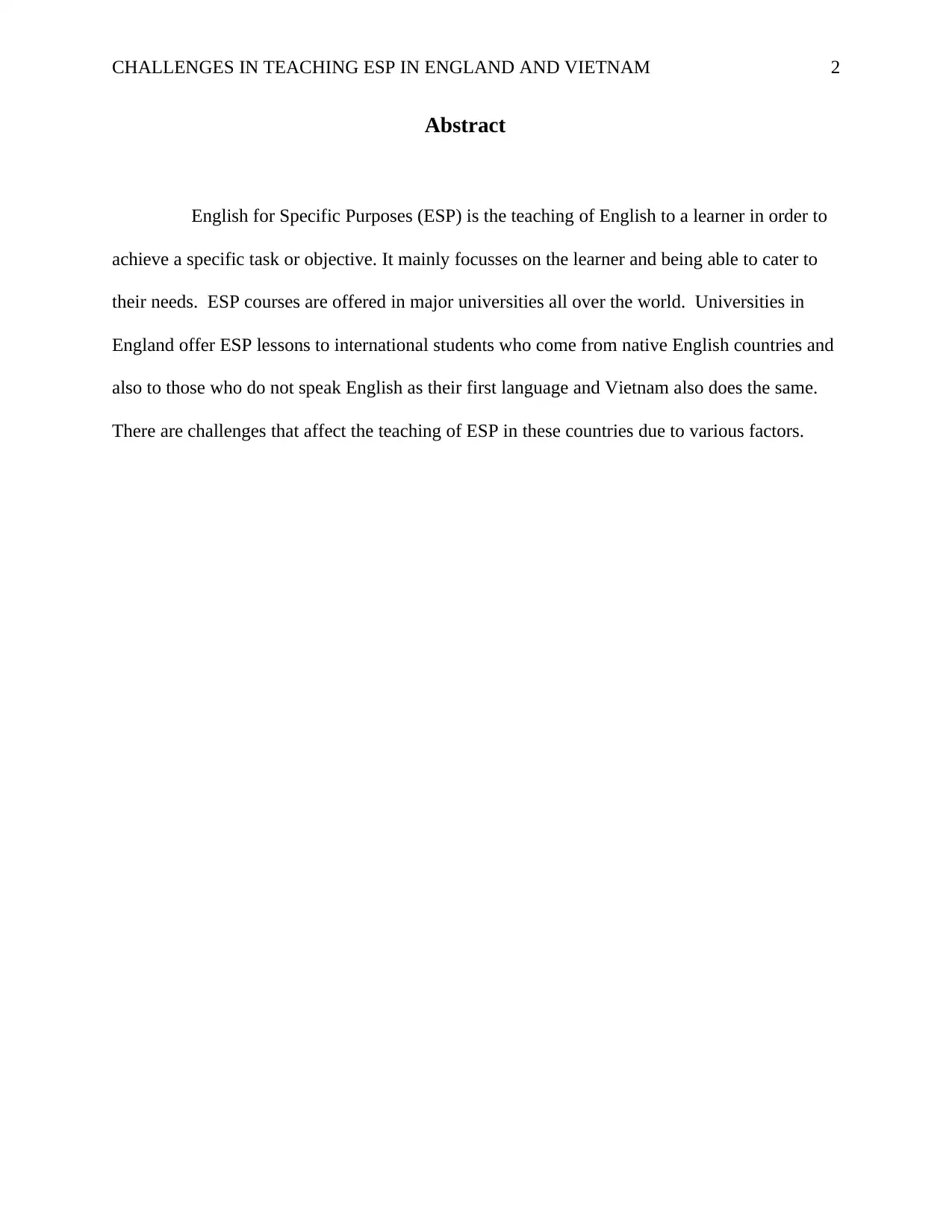
CHALLENGES IN TEACHING ESP IN ENGLAND AND VIETNAM 2
Abstract
English for Specific Purposes (ESP) is the teaching of English to a learner in order to
achieve a specific task or objective. It mainly focusses on the learner and being able to cater to
their needs. ESP courses are offered in major universities all over the world. Universities in
England offer ESP lessons to international students who come from native English countries and
also to those who do not speak English as their first language and Vietnam also does the same.
There are challenges that affect the teaching of ESP in these countries due to various factors.
Abstract
English for Specific Purposes (ESP) is the teaching of English to a learner in order to
achieve a specific task or objective. It mainly focusses on the learner and being able to cater to
their needs. ESP courses are offered in major universities all over the world. Universities in
England offer ESP lessons to international students who come from native English countries and
also to those who do not speak English as their first language and Vietnam also does the same.
There are challenges that affect the teaching of ESP in these countries due to various factors.
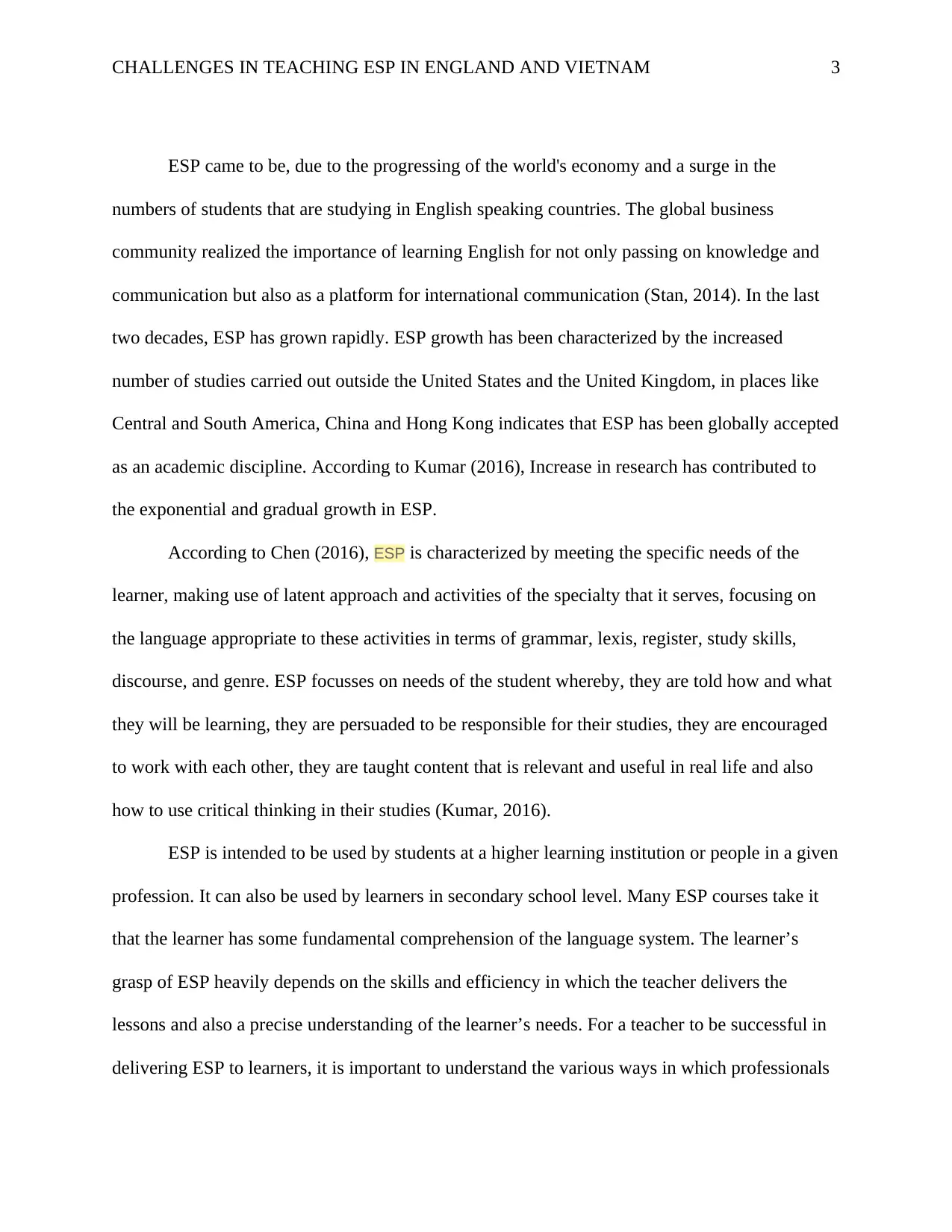
CHALLENGES IN TEACHING ESP IN ENGLAND AND VIETNAM 3
ESP came to be, due to the progressing of the world's economy and a surge in the
numbers of students that are studying in English speaking countries. The global business
community realized the importance of learning English for not only passing on knowledge and
communication but also as a platform for international communication (Stan, 2014). In the last
two decades, ESP has grown rapidly. ESP growth has been characterized by the increased
number of studies carried out outside the United States and the United Kingdom, in places like
Central and South America, China and Hong Kong indicates that ESP has been globally accepted
as an academic discipline. According to Kumar (2016), Increase in research has contributed to
the exponential and gradual growth in ESP.
According to Chen (2016), ESP is characterized by meeting the specific needs of the
learner, making use of latent approach and activities of the specialty that it serves, focusing on
the language appropriate to these activities in terms of grammar, lexis, register, study skills,
discourse, and genre. ESP focusses on needs of the student whereby, they are told how and what
they will be learning, they are persuaded to be responsible for their studies, they are encouraged
to work with each other, they are taught content that is relevant and useful in real life and also
how to use critical thinking in their studies (Kumar, 2016).
ESP is intended to be used by students at a higher learning institution or people in a given
profession. It can also be used by learners in secondary school level. Many ESP courses take it
that the learner has some fundamental comprehension of the language system. The learner’s
grasp of ESP heavily depends on the skills and efficiency in which the teacher delivers the
lessons and also a precise understanding of the learner’s needs. For a teacher to be successful in
delivering ESP to learners, it is important to understand the various ways in which professionals
ESP came to be, due to the progressing of the world's economy and a surge in the
numbers of students that are studying in English speaking countries. The global business
community realized the importance of learning English for not only passing on knowledge and
communication but also as a platform for international communication (Stan, 2014). In the last
two decades, ESP has grown rapidly. ESP growth has been characterized by the increased
number of studies carried out outside the United States and the United Kingdom, in places like
Central and South America, China and Hong Kong indicates that ESP has been globally accepted
as an academic discipline. According to Kumar (2016), Increase in research has contributed to
the exponential and gradual growth in ESP.
According to Chen (2016), ESP is characterized by meeting the specific needs of the
learner, making use of latent approach and activities of the specialty that it serves, focusing on
the language appropriate to these activities in terms of grammar, lexis, register, study skills,
discourse, and genre. ESP focusses on needs of the student whereby, they are told how and what
they will be learning, they are persuaded to be responsible for their studies, they are encouraged
to work with each other, they are taught content that is relevant and useful in real life and also
how to use critical thinking in their studies (Kumar, 2016).
ESP is intended to be used by students at a higher learning institution or people in a given
profession. It can also be used by learners in secondary school level. Many ESP courses take it
that the learner has some fundamental comprehension of the language system. The learner’s
grasp of ESP heavily depends on the skills and efficiency in which the teacher delivers the
lessons and also a precise understanding of the learner’s needs. For a teacher to be successful in
delivering ESP to learners, it is important to understand the various ways in which professionals
⊘ This is a preview!⊘
Do you want full access?
Subscribe today to unlock all pages.

Trusted by 1+ million students worldwide
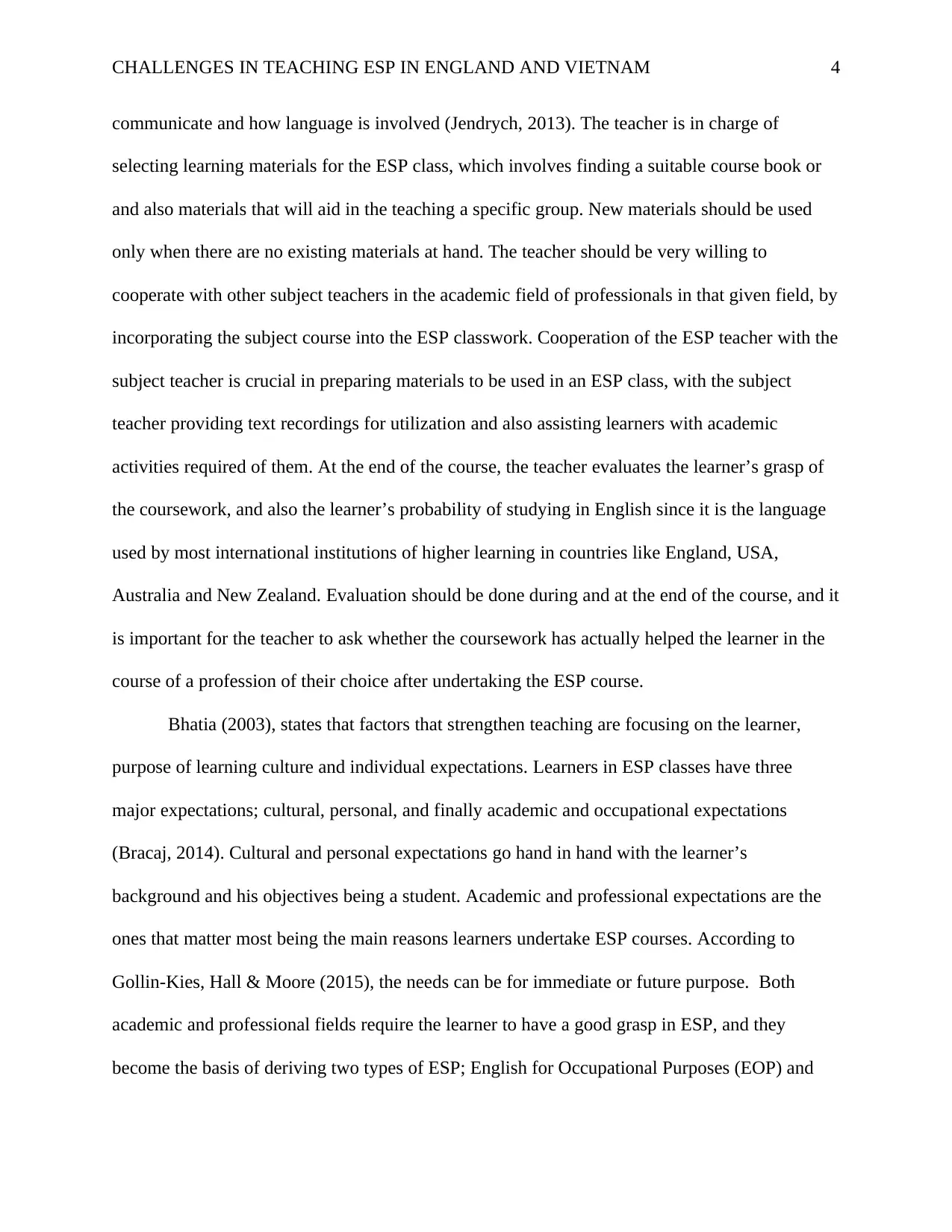
CHALLENGES IN TEACHING ESP IN ENGLAND AND VIETNAM 4
communicate and how language is involved (Jendrych, 2013). The teacher is in charge of
selecting learning materials for the ESP class, which involves finding a suitable course book or
and also materials that will aid in the teaching a specific group. New materials should be used
only when there are no existing materials at hand. The teacher should be very willing to
cooperate with other subject teachers in the academic field of professionals in that given field, by
incorporating the subject course into the ESP classwork. Cooperation of the ESP teacher with the
subject teacher is crucial in preparing materials to be used in an ESP class, with the subject
teacher providing text recordings for utilization and also assisting learners with academic
activities required of them. At the end of the course, the teacher evaluates the learner’s grasp of
the coursework, and also the learner’s probability of studying in English since it is the language
used by most international institutions of higher learning in countries like England, USA,
Australia and New Zealand. Evaluation should be done during and at the end of the course, and it
is important for the teacher to ask whether the coursework has actually helped the learner in the
course of a profession of their choice after undertaking the ESP course.
Bhatia (2003), states that factors that strengthen teaching are focusing on the learner,
purpose of learning culture and individual expectations. Learners in ESP classes have three
major expectations; cultural, personal, and finally academic and occupational expectations
(Bracaj, 2014). Cultural and personal expectations go hand in hand with the learner’s
background and his objectives being a student. Academic and professional expectations are the
ones that matter most being the main reasons learners undertake ESP courses. According to
Gollin-Kies, Hall & Moore (2015), the needs can be for immediate or future purpose. Both
academic and professional fields require the learner to have a good grasp in ESP, and they
become the basis of deriving two types of ESP; English for Occupational Purposes (EOP) and
communicate and how language is involved (Jendrych, 2013). The teacher is in charge of
selecting learning materials for the ESP class, which involves finding a suitable course book or
and also materials that will aid in the teaching a specific group. New materials should be used
only when there are no existing materials at hand. The teacher should be very willing to
cooperate with other subject teachers in the academic field of professionals in that given field, by
incorporating the subject course into the ESP classwork. Cooperation of the ESP teacher with the
subject teacher is crucial in preparing materials to be used in an ESP class, with the subject
teacher providing text recordings for utilization and also assisting learners with academic
activities required of them. At the end of the course, the teacher evaluates the learner’s grasp of
the coursework, and also the learner’s probability of studying in English since it is the language
used by most international institutions of higher learning in countries like England, USA,
Australia and New Zealand. Evaluation should be done during and at the end of the course, and it
is important for the teacher to ask whether the coursework has actually helped the learner in the
course of a profession of their choice after undertaking the ESP course.
Bhatia (2003), states that factors that strengthen teaching are focusing on the learner,
purpose of learning culture and individual expectations. Learners in ESP classes have three
major expectations; cultural, personal, and finally academic and occupational expectations
(Bracaj, 2014). Cultural and personal expectations go hand in hand with the learner’s
background and his objectives being a student. Academic and professional expectations are the
ones that matter most being the main reasons learners undertake ESP courses. According to
Gollin-Kies, Hall & Moore (2015), the needs can be for immediate or future purpose. Both
academic and professional fields require the learner to have a good grasp in ESP, and they
become the basis of deriving two types of ESP; English for Occupational Purposes (EOP) and
Paraphrase This Document
Need a fresh take? Get an instant paraphrase of this document with our AI Paraphraser
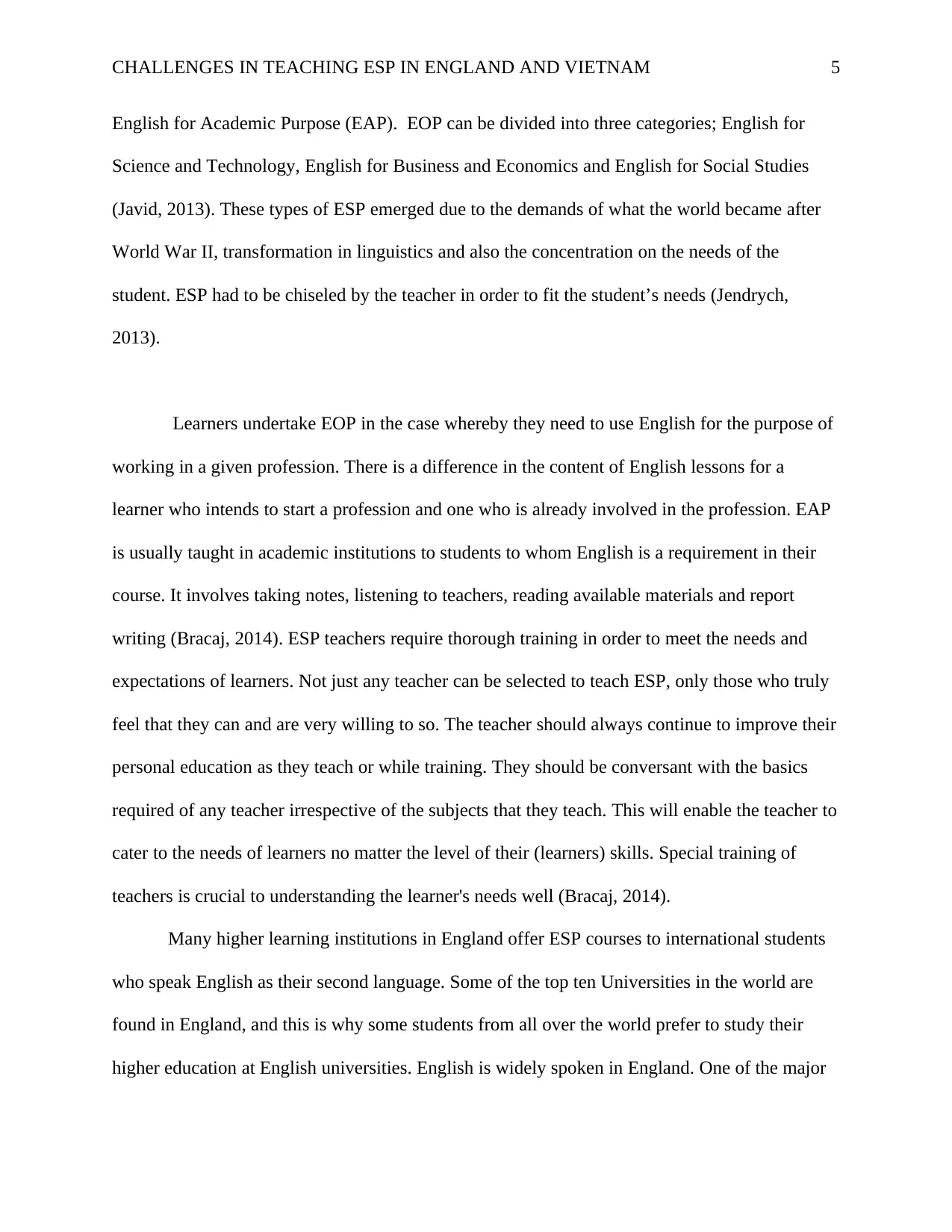
CHALLENGES IN TEACHING ESP IN ENGLAND AND VIETNAM 5
English for Academic Purpose (EAP). EOP can be divided into three categories; English for
Science and Technology, English for Business and Economics and English for Social Studies
(Javid, 2013). These types of ESP emerged due to the demands of what the world became after
World War II, transformation in linguistics and also the concentration on the needs of the
student. ESP had to be chiseled by the teacher in order to fit the student’s needs (Jendrych,
2013).
Learners undertake EOP in the case whereby they need to use English for the purpose of
working in a given profession. There is a difference in the content of English lessons for a
learner who intends to start a profession and one who is already involved in the profession. EAP
is usually taught in academic institutions to students to whom English is a requirement in their
course. It involves taking notes, listening to teachers, reading available materials and report
writing (Bracaj, 2014). ESP teachers require thorough training in order to meet the needs and
expectations of learners. Not just any teacher can be selected to teach ESP, only those who truly
feel that they can and are very willing to so. The teacher should always continue to improve their
personal education as they teach or while training. They should be conversant with the basics
required of any teacher irrespective of the subjects that they teach. This will enable the teacher to
cater to the needs of learners no matter the level of their (learners) skills. Special training of
teachers is crucial to understanding the learner's needs well (Bracaj, 2014).
Many higher learning institutions in England offer ESP courses to international students
who speak English as their second language. Some of the top ten Universities in the world are
found in England, and this is why some students from all over the world prefer to study their
higher education at English universities. English is widely spoken in England. One of the major
English for Academic Purpose (EAP). EOP can be divided into three categories; English for
Science and Technology, English for Business and Economics and English for Social Studies
(Javid, 2013). These types of ESP emerged due to the demands of what the world became after
World War II, transformation in linguistics and also the concentration on the needs of the
student. ESP had to be chiseled by the teacher in order to fit the student’s needs (Jendrych,
2013).
Learners undertake EOP in the case whereby they need to use English for the purpose of
working in a given profession. There is a difference in the content of English lessons for a
learner who intends to start a profession and one who is already involved in the profession. EAP
is usually taught in academic institutions to students to whom English is a requirement in their
course. It involves taking notes, listening to teachers, reading available materials and report
writing (Bracaj, 2014). ESP teachers require thorough training in order to meet the needs and
expectations of learners. Not just any teacher can be selected to teach ESP, only those who truly
feel that they can and are very willing to so. The teacher should always continue to improve their
personal education as they teach or while training. They should be conversant with the basics
required of any teacher irrespective of the subjects that they teach. This will enable the teacher to
cater to the needs of learners no matter the level of their (learners) skills. Special training of
teachers is crucial to understanding the learner's needs well (Bracaj, 2014).
Many higher learning institutions in England offer ESP courses to international students
who speak English as their second language. Some of the top ten Universities in the world are
found in England, and this is why some students from all over the world prefer to study their
higher education at English universities. English is widely spoken in England. One of the major
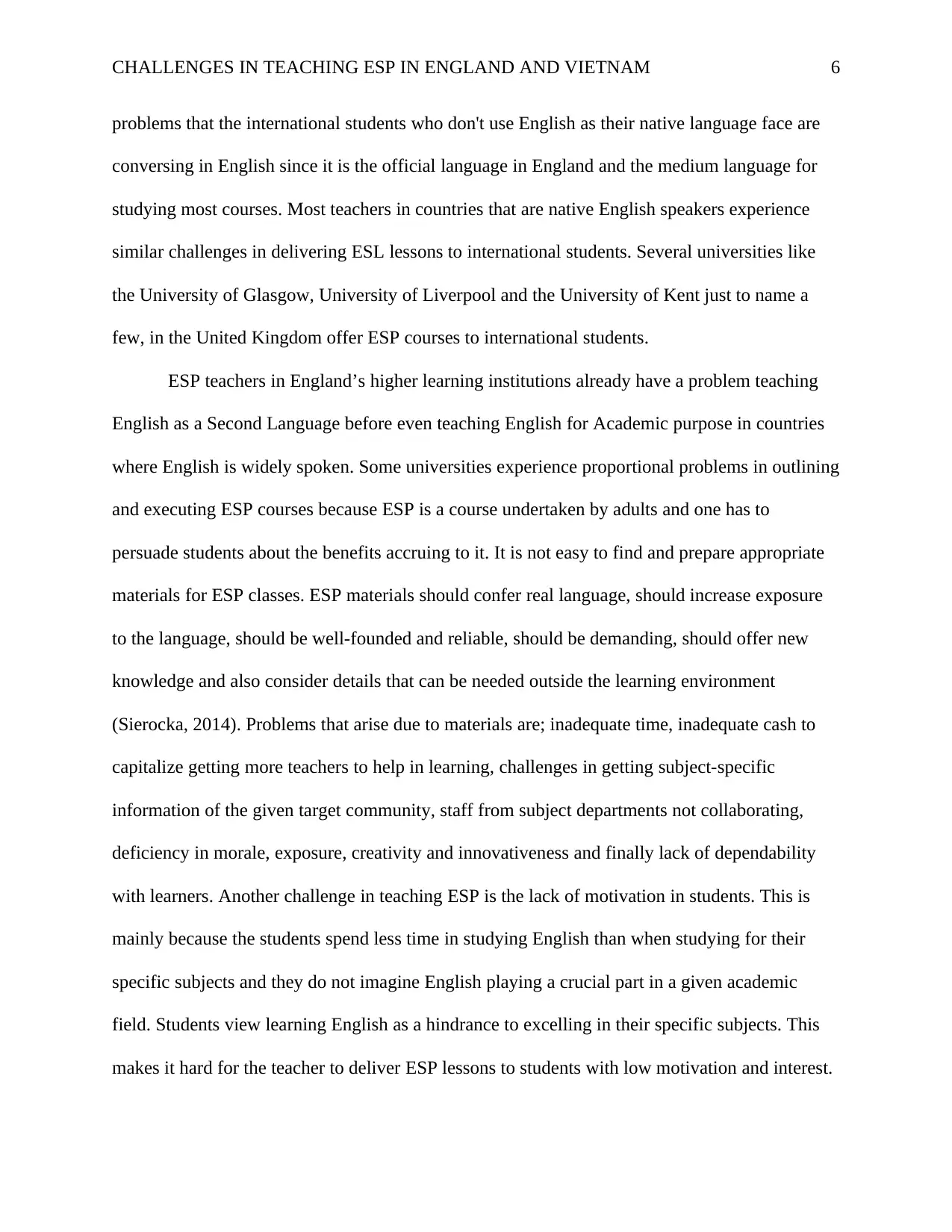
CHALLENGES IN TEACHING ESP IN ENGLAND AND VIETNAM 6
problems that the international students who don't use English as their native language face are
conversing in English since it is the official language in England and the medium language for
studying most courses. Most teachers in countries that are native English speakers experience
similar challenges in delivering ESL lessons to international students. Several universities like
the University of Glasgow, University of Liverpool and the University of Kent just to name a
few, in the United Kingdom offer ESP courses to international students.
ESP teachers in England’s higher learning institutions already have a problem teaching
English as a Second Language before even teaching English for Academic purpose in countries
where English is widely spoken. Some universities experience proportional problems in outlining
and executing ESP courses because ESP is a course undertaken by adults and one has to
persuade students about the benefits accruing to it. It is not easy to find and prepare appropriate
materials for ESP classes. ESP materials should confer real language, should increase exposure
to the language, should be well-founded and reliable, should be demanding, should offer new
knowledge and also consider details that can be needed outside the learning environment
(Sierocka, 2014). Problems that arise due to materials are; inadequate time, inadequate cash to
capitalize getting more teachers to help in learning, challenges in getting subject-specific
information of the given target community, staff from subject departments not collaborating,
deficiency in morale, exposure, creativity and innovativeness and finally lack of dependability
with learners. Another challenge in teaching ESP is the lack of motivation in students. This is
mainly because the students spend less time in studying English than when studying for their
specific subjects and they do not imagine English playing a crucial part in a given academic
field. Students view learning English as a hindrance to excelling in their specific subjects. This
makes it hard for the teacher to deliver ESP lessons to students with low motivation and interest.
problems that the international students who don't use English as their native language face are
conversing in English since it is the official language in England and the medium language for
studying most courses. Most teachers in countries that are native English speakers experience
similar challenges in delivering ESL lessons to international students. Several universities like
the University of Glasgow, University of Liverpool and the University of Kent just to name a
few, in the United Kingdom offer ESP courses to international students.
ESP teachers in England’s higher learning institutions already have a problem teaching
English as a Second Language before even teaching English for Academic purpose in countries
where English is widely spoken. Some universities experience proportional problems in outlining
and executing ESP courses because ESP is a course undertaken by adults and one has to
persuade students about the benefits accruing to it. It is not easy to find and prepare appropriate
materials for ESP classes. ESP materials should confer real language, should increase exposure
to the language, should be well-founded and reliable, should be demanding, should offer new
knowledge and also consider details that can be needed outside the learning environment
(Sierocka, 2014). Problems that arise due to materials are; inadequate time, inadequate cash to
capitalize getting more teachers to help in learning, challenges in getting subject-specific
information of the given target community, staff from subject departments not collaborating,
deficiency in morale, exposure, creativity and innovativeness and finally lack of dependability
with learners. Another challenge in teaching ESP is the lack of motivation in students. This is
mainly because the students spend less time in studying English than when studying for their
specific subjects and they do not imagine English playing a crucial part in a given academic
field. Students view learning English as a hindrance to excelling in their specific subjects. This
makes it hard for the teacher to deliver ESP lessons to students with low motivation and interest.
⊘ This is a preview!⊘
Do you want full access?
Subscribe today to unlock all pages.

Trusted by 1+ million students worldwide
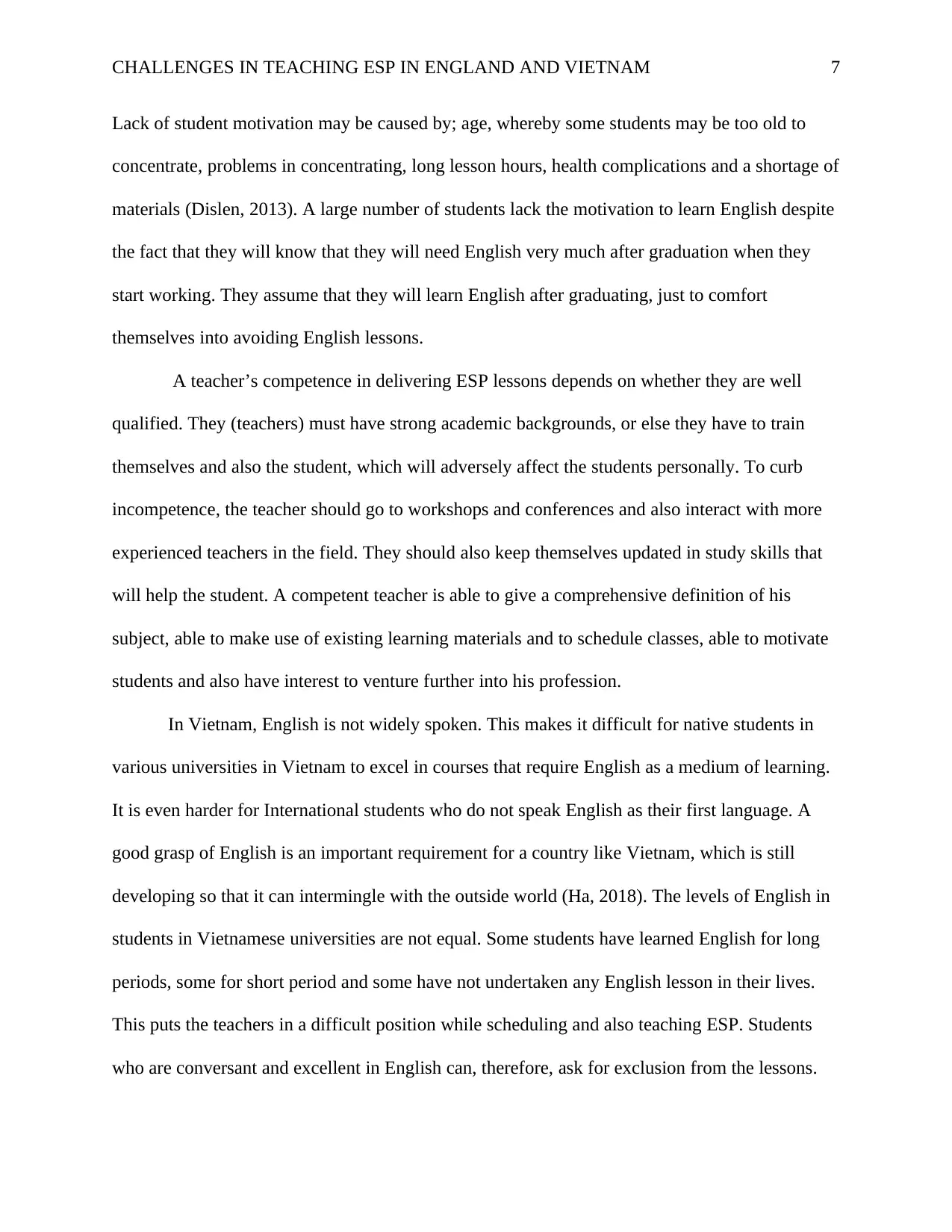
CHALLENGES IN TEACHING ESP IN ENGLAND AND VIETNAM 7
Lack of student motivation may be caused by; age, whereby some students may be too old to
concentrate, problems in concentrating, long lesson hours, health complications and a shortage of
materials (Dislen, 2013). A large number of students lack the motivation to learn English despite
the fact that they will know that they will need English very much after graduation when they
start working. They assume that they will learn English after graduating, just to comfort
themselves into avoiding English lessons.
A teacher’s competence in delivering ESP lessons depends on whether they are well
qualified. They (teachers) must have strong academic backgrounds, or else they have to train
themselves and also the student, which will adversely affect the students personally. To curb
incompetence, the teacher should go to workshops and conferences and also interact with more
experienced teachers in the field. They should also keep themselves updated in study skills that
will help the student. A competent teacher is able to give a comprehensive definition of his
subject, able to make use of existing learning materials and to schedule classes, able to motivate
students and also have interest to venture further into his profession.
In Vietnam, English is not widely spoken. This makes it difficult for native students in
various universities in Vietnam to excel in courses that require English as a medium of learning.
It is even harder for International students who do not speak English as their first language. A
good grasp of English is an important requirement for a country like Vietnam, which is still
developing so that it can intermingle with the outside world (Ha, 2018). The levels of English in
students in Vietnamese universities are not equal. Some students have learned English for long
periods, some for short period and some have not undertaken any English lesson in their lives.
This puts the teachers in a difficult position while scheduling and also teaching ESP. Students
who are conversant and excellent in English can, therefore, ask for exclusion from the lessons.
Lack of student motivation may be caused by; age, whereby some students may be too old to
concentrate, problems in concentrating, long lesson hours, health complications and a shortage of
materials (Dislen, 2013). A large number of students lack the motivation to learn English despite
the fact that they will know that they will need English very much after graduation when they
start working. They assume that they will learn English after graduating, just to comfort
themselves into avoiding English lessons.
A teacher’s competence in delivering ESP lessons depends on whether they are well
qualified. They (teachers) must have strong academic backgrounds, or else they have to train
themselves and also the student, which will adversely affect the students personally. To curb
incompetence, the teacher should go to workshops and conferences and also interact with more
experienced teachers in the field. They should also keep themselves updated in study skills that
will help the student. A competent teacher is able to give a comprehensive definition of his
subject, able to make use of existing learning materials and to schedule classes, able to motivate
students and also have interest to venture further into his profession.
In Vietnam, English is not widely spoken. This makes it difficult for native students in
various universities in Vietnam to excel in courses that require English as a medium of learning.
It is even harder for International students who do not speak English as their first language. A
good grasp of English is an important requirement for a country like Vietnam, which is still
developing so that it can intermingle with the outside world (Ha, 2018). The levels of English in
students in Vietnamese universities are not equal. Some students have learned English for long
periods, some for short period and some have not undertaken any English lesson in their lives.
This puts the teachers in a difficult position while scheduling and also teaching ESP. Students
who are conversant and excellent in English can, therefore, ask for exclusion from the lessons.
Paraphrase This Document
Need a fresh take? Get an instant paraphrase of this document with our AI Paraphraser
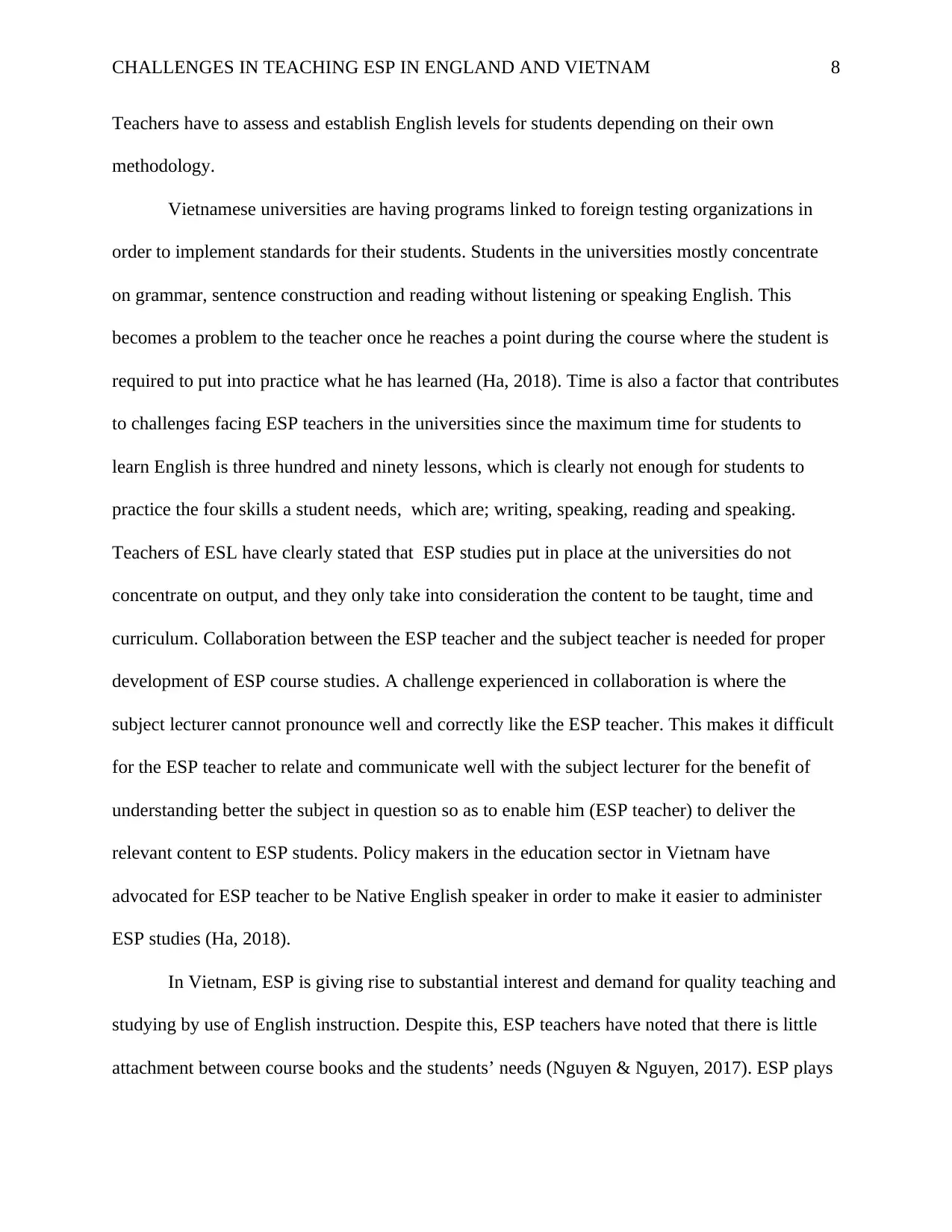
CHALLENGES IN TEACHING ESP IN ENGLAND AND VIETNAM 8
Teachers have to assess and establish English levels for students depending on their own
methodology.
Vietnamese universities are having programs linked to foreign testing organizations in
order to implement standards for their students. Students in the universities mostly concentrate
on grammar, sentence construction and reading without listening or speaking English. This
becomes a problem to the teacher once he reaches a point during the course where the student is
required to put into practice what he has learned (Ha, 2018). Time is also a factor that contributes
to challenges facing ESP teachers in the universities since the maximum time for students to
learn English is three hundred and ninety lessons, which is clearly not enough for students to
practice the four skills a student needs, which are; writing, speaking, reading and speaking.
Teachers of ESL have clearly stated that ESP studies put in place at the universities do not
concentrate on output, and they only take into consideration the content to be taught, time and
curriculum. Collaboration between the ESP teacher and the subject teacher is needed for proper
development of ESP course studies. A challenge experienced in collaboration is where the
subject lecturer cannot pronounce well and correctly like the ESP teacher. This makes it difficult
for the ESP teacher to relate and communicate well with the subject lecturer for the benefit of
understanding better the subject in question so as to enable him (ESP teacher) to deliver the
relevant content to ESP students. Policy makers in the education sector in Vietnam have
advocated for ESP teacher to be Native English speaker in order to make it easier to administer
ESP studies (Ha, 2018).
In Vietnam, ESP is giving rise to substantial interest and demand for quality teaching and
studying by use of English instruction. Despite this, ESP teachers have noted that there is little
attachment between course books and the students’ needs (Nguyen & Nguyen, 2017). ESP plays
Teachers have to assess and establish English levels for students depending on their own
methodology.
Vietnamese universities are having programs linked to foreign testing organizations in
order to implement standards for their students. Students in the universities mostly concentrate
on grammar, sentence construction and reading without listening or speaking English. This
becomes a problem to the teacher once he reaches a point during the course where the student is
required to put into practice what he has learned (Ha, 2018). Time is also a factor that contributes
to challenges facing ESP teachers in the universities since the maximum time for students to
learn English is three hundred and ninety lessons, which is clearly not enough for students to
practice the four skills a student needs, which are; writing, speaking, reading and speaking.
Teachers of ESL have clearly stated that ESP studies put in place at the universities do not
concentrate on output, and they only take into consideration the content to be taught, time and
curriculum. Collaboration between the ESP teacher and the subject teacher is needed for proper
development of ESP course studies. A challenge experienced in collaboration is where the
subject lecturer cannot pronounce well and correctly like the ESP teacher. This makes it difficult
for the ESP teacher to relate and communicate well with the subject lecturer for the benefit of
understanding better the subject in question so as to enable him (ESP teacher) to deliver the
relevant content to ESP students. Policy makers in the education sector in Vietnam have
advocated for ESP teacher to be Native English speaker in order to make it easier to administer
ESP studies (Ha, 2018).
In Vietnam, ESP is giving rise to substantial interest and demand for quality teaching and
studying by use of English instruction. Despite this, ESP teachers have noted that there is little
attachment between course books and the students’ needs (Nguyen & Nguyen, 2017). ESP plays
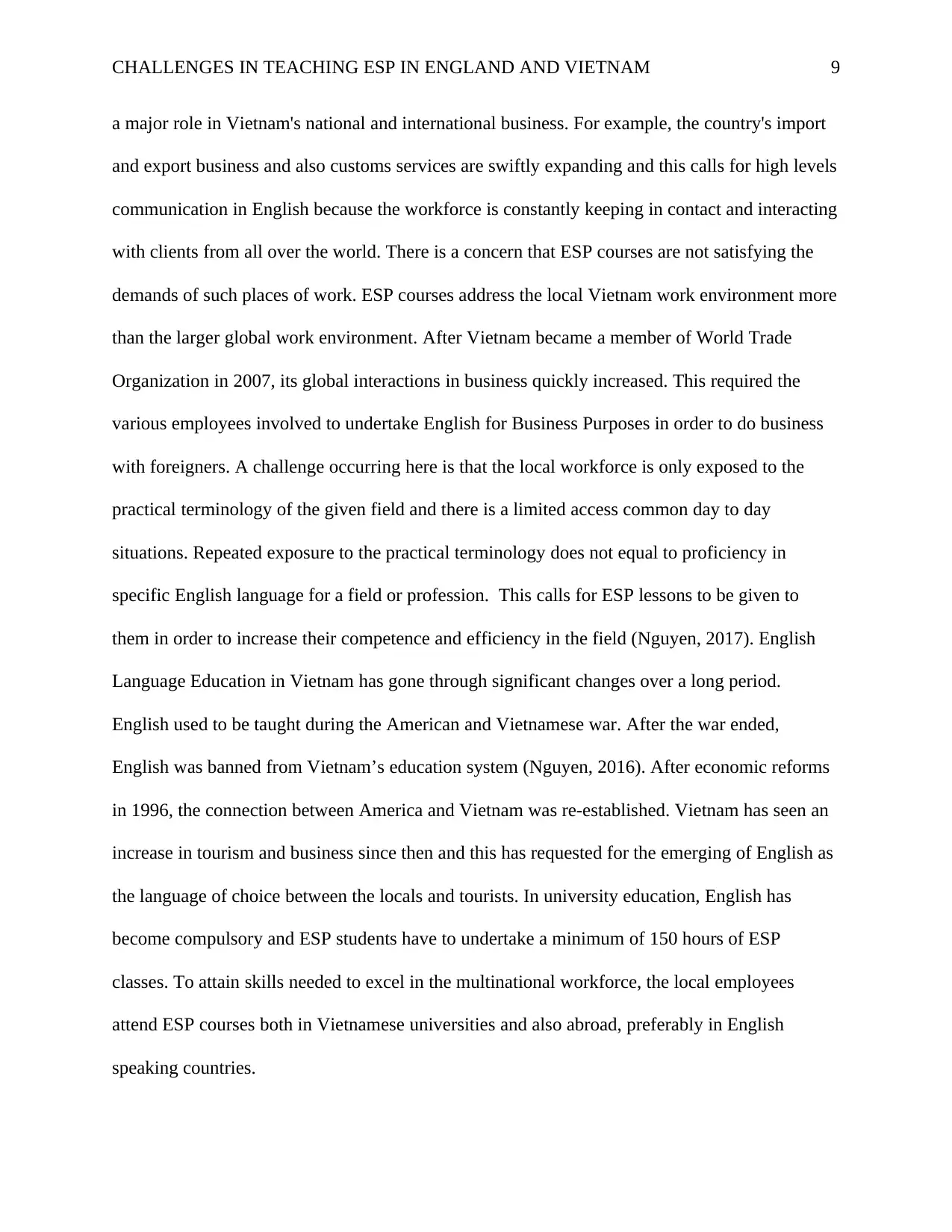
CHALLENGES IN TEACHING ESP IN ENGLAND AND VIETNAM 9
a major role in Vietnam's national and international business. For example, the country's import
and export business and also customs services are swiftly expanding and this calls for high levels
communication in English because the workforce is constantly keeping in contact and interacting
with clients from all over the world. There is a concern that ESP courses are not satisfying the
demands of such places of work. ESP courses address the local Vietnam work environment more
than the larger global work environment. After Vietnam became a member of World Trade
Organization in 2007, its global interactions in business quickly increased. This required the
various employees involved to undertake English for Business Purposes in order to do business
with foreigners. A challenge occurring here is that the local workforce is only exposed to the
practical terminology of the given field and there is a limited access common day to day
situations. Repeated exposure to the practical terminology does not equal to proficiency in
specific English language for a field or profession. This calls for ESP lessons to be given to
them in order to increase their competence and efficiency in the field (Nguyen, 2017). English
Language Education in Vietnam has gone through significant changes over a long period.
English used to be taught during the American and Vietnamese war. After the war ended,
English was banned from Vietnam’s education system (Nguyen, 2016). After economic reforms
in 1996, the connection between America and Vietnam was re-established. Vietnam has seen an
increase in tourism and business since then and this has requested for the emerging of English as
the language of choice between the locals and tourists. In university education, English has
become compulsory and ESP students have to undertake a minimum of 150 hours of ESP
classes. To attain skills needed to excel in the multinational workforce, the local employees
attend ESP courses both in Vietnamese universities and also abroad, preferably in English
speaking countries.
a major role in Vietnam's national and international business. For example, the country's import
and export business and also customs services are swiftly expanding and this calls for high levels
communication in English because the workforce is constantly keeping in contact and interacting
with clients from all over the world. There is a concern that ESP courses are not satisfying the
demands of such places of work. ESP courses address the local Vietnam work environment more
than the larger global work environment. After Vietnam became a member of World Trade
Organization in 2007, its global interactions in business quickly increased. This required the
various employees involved to undertake English for Business Purposes in order to do business
with foreigners. A challenge occurring here is that the local workforce is only exposed to the
practical terminology of the given field and there is a limited access common day to day
situations. Repeated exposure to the practical terminology does not equal to proficiency in
specific English language for a field or profession. This calls for ESP lessons to be given to
them in order to increase their competence and efficiency in the field (Nguyen, 2017). English
Language Education in Vietnam has gone through significant changes over a long period.
English used to be taught during the American and Vietnamese war. After the war ended,
English was banned from Vietnam’s education system (Nguyen, 2016). After economic reforms
in 1996, the connection between America and Vietnam was re-established. Vietnam has seen an
increase in tourism and business since then and this has requested for the emerging of English as
the language of choice between the locals and tourists. In university education, English has
become compulsory and ESP students have to undertake a minimum of 150 hours of ESP
classes. To attain skills needed to excel in the multinational workforce, the local employees
attend ESP courses both in Vietnamese universities and also abroad, preferably in English
speaking countries.
⊘ This is a preview!⊘
Do you want full access?
Subscribe today to unlock all pages.

Trusted by 1+ million students worldwide
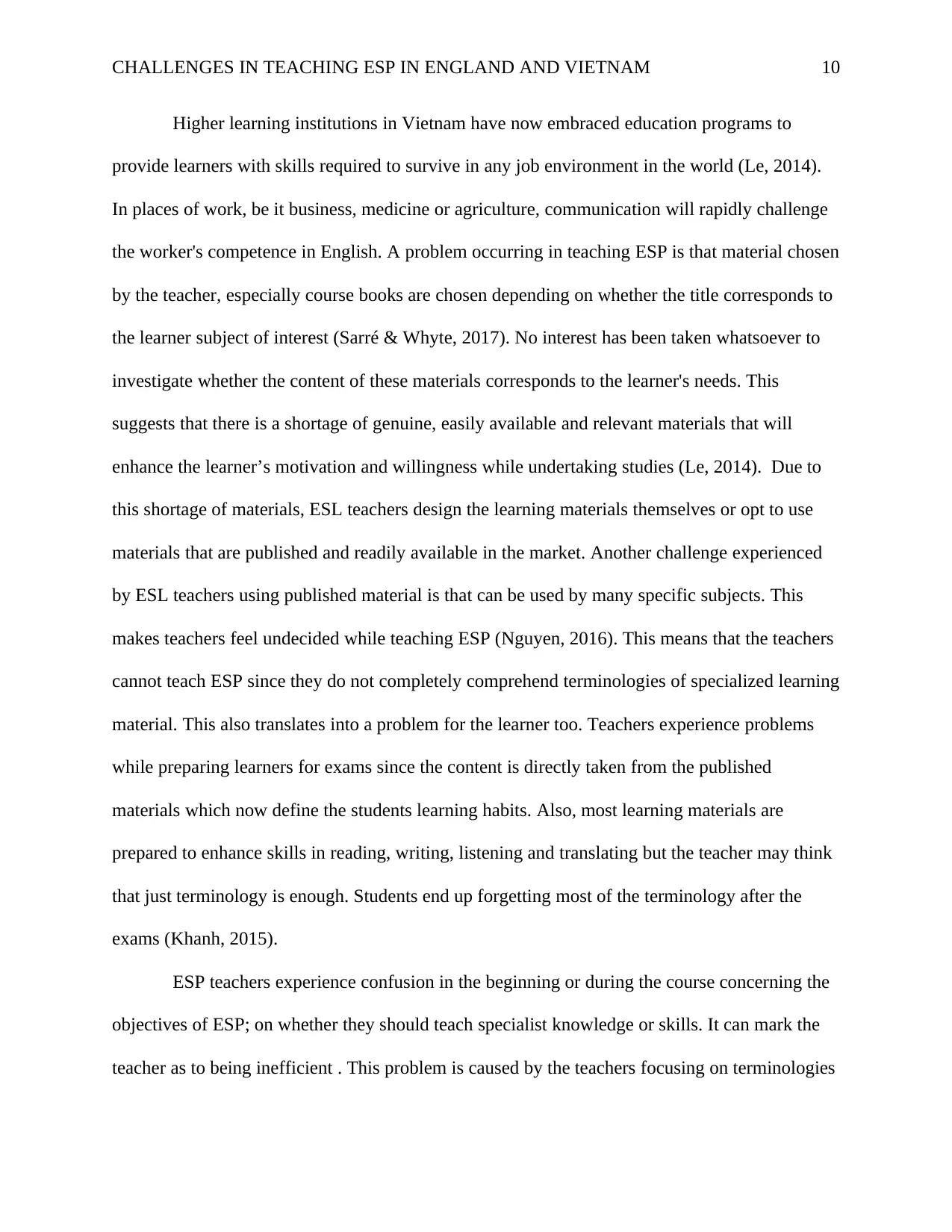
CHALLENGES IN TEACHING ESP IN ENGLAND AND VIETNAM 10
Higher learning institutions in Vietnam have now embraced education programs to
provide learners with skills required to survive in any job environment in the world (Le, 2014).
In places of work, be it business, medicine or agriculture, communication will rapidly challenge
the worker's competence in English. A problem occurring in teaching ESP is that material chosen
by the teacher, especially course books are chosen depending on whether the title corresponds to
the learner subject of interest (Sarré & Whyte, 2017). No interest has been taken whatsoever to
investigate whether the content of these materials corresponds to the learner's needs. This
suggests that there is a shortage of genuine, easily available and relevant materials that will
enhance the learner’s motivation and willingness while undertaking studies (Le, 2014). Due to
this shortage of materials, ESL teachers design the learning materials themselves or opt to use
materials that are published and readily available in the market. Another challenge experienced
by ESL teachers using published material is that can be used by many specific subjects. This
makes teachers feel undecided while teaching ESP (Nguyen, 2016). This means that the teachers
cannot teach ESP since they do not completely comprehend terminologies of specialized learning
material. This also translates into a problem for the learner too. Teachers experience problems
while preparing learners for exams since the content is directly taken from the published
materials which now define the students learning habits. Also, most learning materials are
prepared to enhance skills in reading, writing, listening and translating but the teacher may think
that just terminology is enough. Students end up forgetting most of the terminology after the
exams (Khanh, 2015).
ESP teachers experience confusion in the beginning or during the course concerning the
objectives of ESP; on whether they should teach specialist knowledge or skills. It can mark the
teacher as to being inefficient . This problem is caused by the teachers focusing on terminologies
Higher learning institutions in Vietnam have now embraced education programs to
provide learners with skills required to survive in any job environment in the world (Le, 2014).
In places of work, be it business, medicine or agriculture, communication will rapidly challenge
the worker's competence in English. A problem occurring in teaching ESP is that material chosen
by the teacher, especially course books are chosen depending on whether the title corresponds to
the learner subject of interest (Sarré & Whyte, 2017). No interest has been taken whatsoever to
investigate whether the content of these materials corresponds to the learner's needs. This
suggests that there is a shortage of genuine, easily available and relevant materials that will
enhance the learner’s motivation and willingness while undertaking studies (Le, 2014). Due to
this shortage of materials, ESL teachers design the learning materials themselves or opt to use
materials that are published and readily available in the market. Another challenge experienced
by ESL teachers using published material is that can be used by many specific subjects. This
makes teachers feel undecided while teaching ESP (Nguyen, 2016). This means that the teachers
cannot teach ESP since they do not completely comprehend terminologies of specialized learning
material. This also translates into a problem for the learner too. Teachers experience problems
while preparing learners for exams since the content is directly taken from the published
materials which now define the students learning habits. Also, most learning materials are
prepared to enhance skills in reading, writing, listening and translating but the teacher may think
that just terminology is enough. Students end up forgetting most of the terminology after the
exams (Khanh, 2015).
ESP teachers experience confusion in the beginning or during the course concerning the
objectives of ESP; on whether they should teach specialist knowledge or skills. It can mark the
teacher as to being inefficient . This problem is caused by the teachers focusing on terminologies
Paraphrase This Document
Need a fresh take? Get an instant paraphrase of this document with our AI Paraphraser
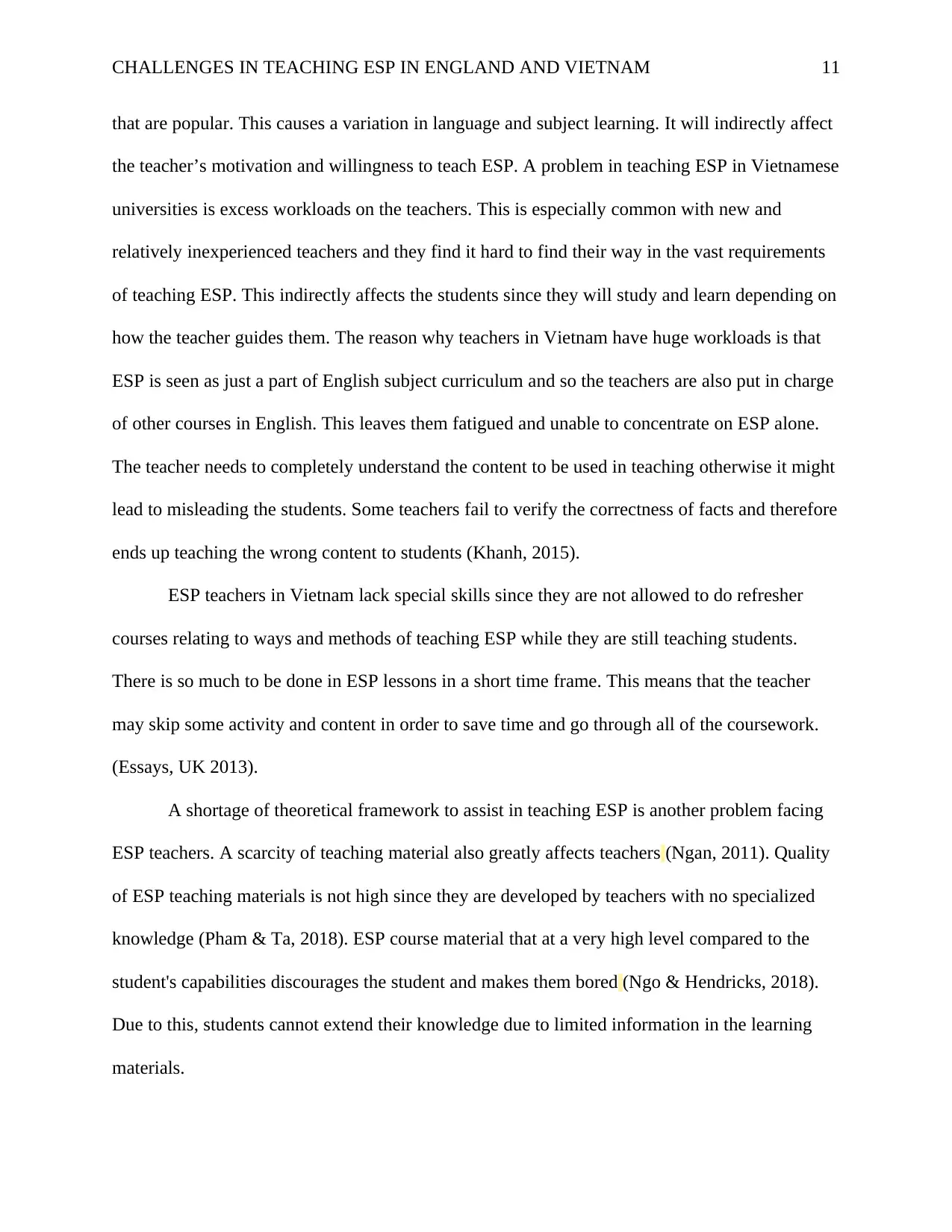
CHALLENGES IN TEACHING ESP IN ENGLAND AND VIETNAM 11
that are popular. This causes a variation in language and subject learning. It will indirectly affect
the teacher’s motivation and willingness to teach ESP. A problem in teaching ESP in Vietnamese
universities is excess workloads on the teachers. This is especially common with new and
relatively inexperienced teachers and they find it hard to find their way in the vast requirements
of teaching ESP. This indirectly affects the students since they will study and learn depending on
how the teacher guides them. The reason why teachers in Vietnam have huge workloads is that
ESP is seen as just a part of English subject curriculum and so the teachers are also put in charge
of other courses in English. This leaves them fatigued and unable to concentrate on ESP alone.
The teacher needs to completely understand the content to be used in teaching otherwise it might
lead to misleading the students. Some teachers fail to verify the correctness of facts and therefore
ends up teaching the wrong content to students (Khanh, 2015).
ESP teachers in Vietnam lack special skills since they are not allowed to do refresher
courses relating to ways and methods of teaching ESP while they are still teaching students.
There is so much to be done in ESP lessons in a short time frame. This means that the teacher
may skip some activity and content in order to save time and go through all of the coursework.
(Essays, UK 2013).
A shortage of theoretical framework to assist in teaching ESP is another problem facing
ESP teachers. A scarcity of teaching material also greatly affects teachers (Ngan, 2011). Quality
of ESP teaching materials is not high since they are developed by teachers with no specialized
knowledge (Pham & Ta, 2018). ESP course material that at a very high level compared to the
student's capabilities discourages the student and makes them bored (Ngo & Hendricks, 2018).
Due to this, students cannot extend their knowledge due to limited information in the learning
materials.
that are popular. This causes a variation in language and subject learning. It will indirectly affect
the teacher’s motivation and willingness to teach ESP. A problem in teaching ESP in Vietnamese
universities is excess workloads on the teachers. This is especially common with new and
relatively inexperienced teachers and they find it hard to find their way in the vast requirements
of teaching ESP. This indirectly affects the students since they will study and learn depending on
how the teacher guides them. The reason why teachers in Vietnam have huge workloads is that
ESP is seen as just a part of English subject curriculum and so the teachers are also put in charge
of other courses in English. This leaves them fatigued and unable to concentrate on ESP alone.
The teacher needs to completely understand the content to be used in teaching otherwise it might
lead to misleading the students. Some teachers fail to verify the correctness of facts and therefore
ends up teaching the wrong content to students (Khanh, 2015).
ESP teachers in Vietnam lack special skills since they are not allowed to do refresher
courses relating to ways and methods of teaching ESP while they are still teaching students.
There is so much to be done in ESP lessons in a short time frame. This means that the teacher
may skip some activity and content in order to save time and go through all of the coursework.
(Essays, UK 2013).
A shortage of theoretical framework to assist in teaching ESP is another problem facing
ESP teachers. A scarcity of teaching material also greatly affects teachers (Ngan, 2011). Quality
of ESP teaching materials is not high since they are developed by teachers with no specialized
knowledge (Pham & Ta, 2018). ESP course material that at a very high level compared to the
student's capabilities discourages the student and makes them bored (Ngo & Hendricks, 2018).
Due to this, students cannot extend their knowledge due to limited information in the learning
materials.
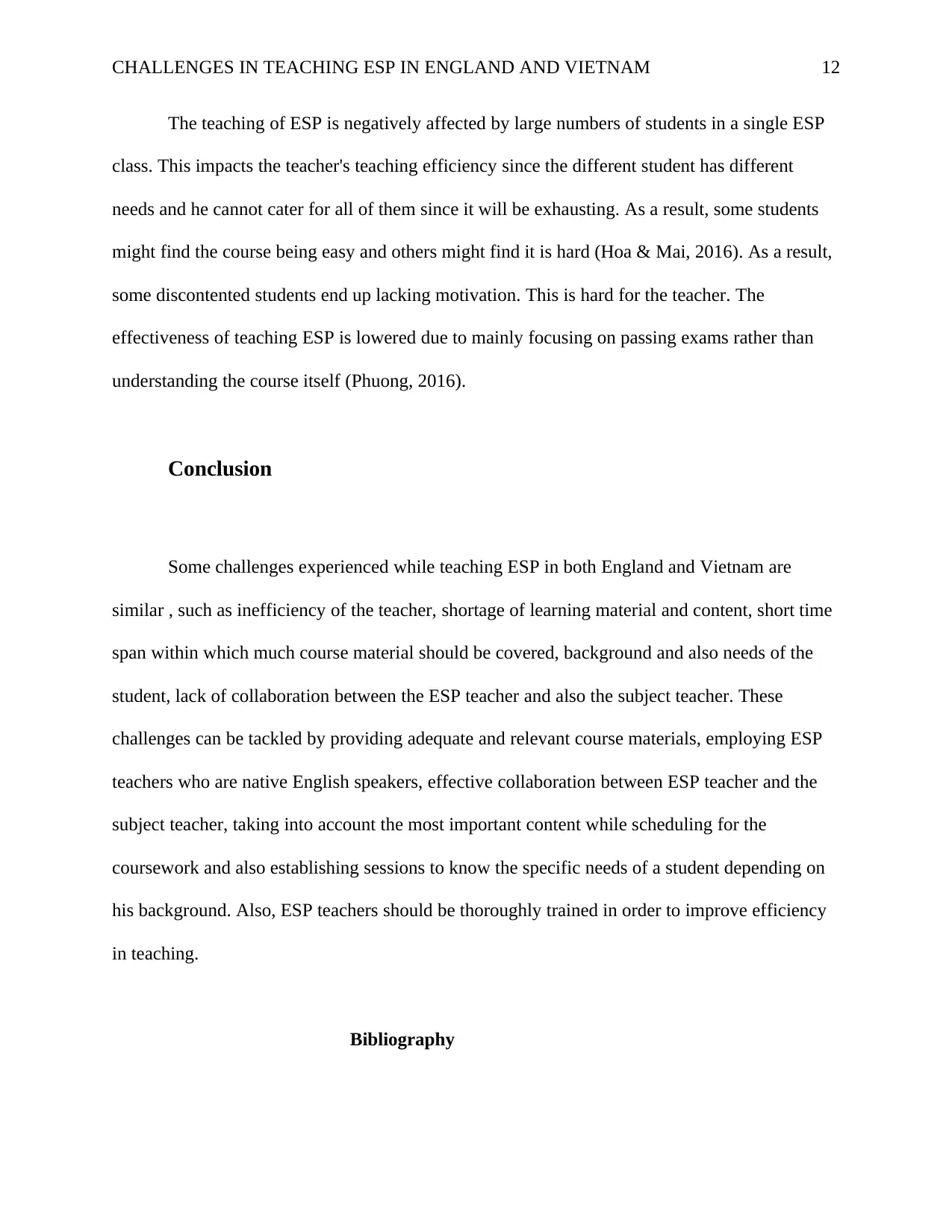
CHALLENGES IN TEACHING ESP IN ENGLAND AND VIETNAM 12
The teaching of ESP is negatively affected by large numbers of students in a single ESP
class. This impacts the teacher's teaching efficiency since the different student has different
needs and he cannot cater for all of them since it will be exhausting. As a result, some students
might find the course being easy and others might find it is hard (Hoa & Mai, 2016). As a result,
some discontented students end up lacking motivation. This is hard for the teacher. The
effectiveness of teaching ESP is lowered due to mainly focusing on passing exams rather than
understanding the course itself (Phuong, 2016).
Conclusion
Some challenges experienced while teaching ESP in both England and Vietnam are
similar , such as inefficiency of the teacher, shortage of learning material and content, short time
span within which much course material should be covered, background and also needs of the
student, lack of collaboration between the ESP teacher and also the subject teacher. These
challenges can be tackled by providing adequate and relevant course materials, employing ESP
teachers who are native English speakers, effective collaboration between ESP teacher and the
subject teacher, taking into account the most important content while scheduling for the
coursework and also establishing sessions to know the specific needs of a student depending on
his background. Also, ESP teachers should be thoroughly trained in order to improve efficiency
in teaching.
Bibliography
The teaching of ESP is negatively affected by large numbers of students in a single ESP
class. This impacts the teacher's teaching efficiency since the different student has different
needs and he cannot cater for all of them since it will be exhausting. As a result, some students
might find the course being easy and others might find it is hard (Hoa & Mai, 2016). As a result,
some discontented students end up lacking motivation. This is hard for the teacher. The
effectiveness of teaching ESP is lowered due to mainly focusing on passing exams rather than
understanding the course itself (Phuong, 2016).
Conclusion
Some challenges experienced while teaching ESP in both England and Vietnam are
similar , such as inefficiency of the teacher, shortage of learning material and content, short time
span within which much course material should be covered, background and also needs of the
student, lack of collaboration between the ESP teacher and also the subject teacher. These
challenges can be tackled by providing adequate and relevant course materials, employing ESP
teachers who are native English speakers, effective collaboration between ESP teacher and the
subject teacher, taking into account the most important content while scheduling for the
coursework and also establishing sessions to know the specific needs of a student depending on
his background. Also, ESP teachers should be thoroughly trained in order to improve efficiency
in teaching.
Bibliography
⊘ This is a preview!⊘
Do you want full access?
Subscribe today to unlock all pages.

Trusted by 1+ million students worldwide
1 out of 17
Related Documents
Your All-in-One AI-Powered Toolkit for Academic Success.
+13062052269
info@desklib.com
Available 24*7 on WhatsApp / Email
![[object Object]](/_next/static/media/star-bottom.7253800d.svg)
Unlock your academic potential
Copyright © 2020–2026 A2Z Services. All Rights Reserved. Developed and managed by ZUCOL.





